新概念英语第二册从属连词课件(共59张PPT)
文档属性
| 名称 | 新概念英语第二册从属连词课件(共59张PPT) | 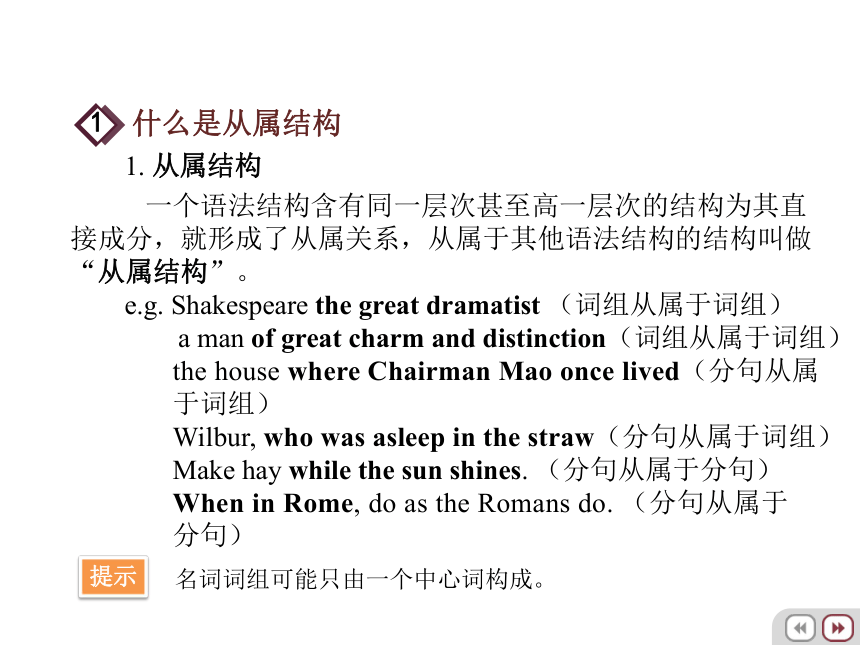 | |
| 格式 | pptx | ||
| 文件大小 | 957.7KB | ||
| 资源类型 | 教案 | ||
| 版本资源 | 新概念英语 | ||
| 科目 | 英语 | ||
| 更新时间 | 2024-11-24 20:15:20 | ||
图片预览


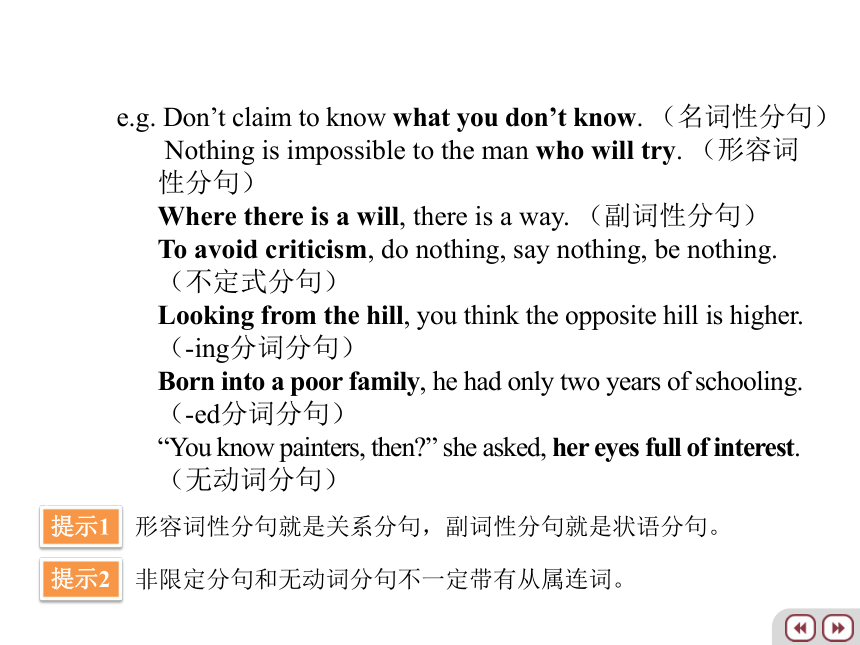
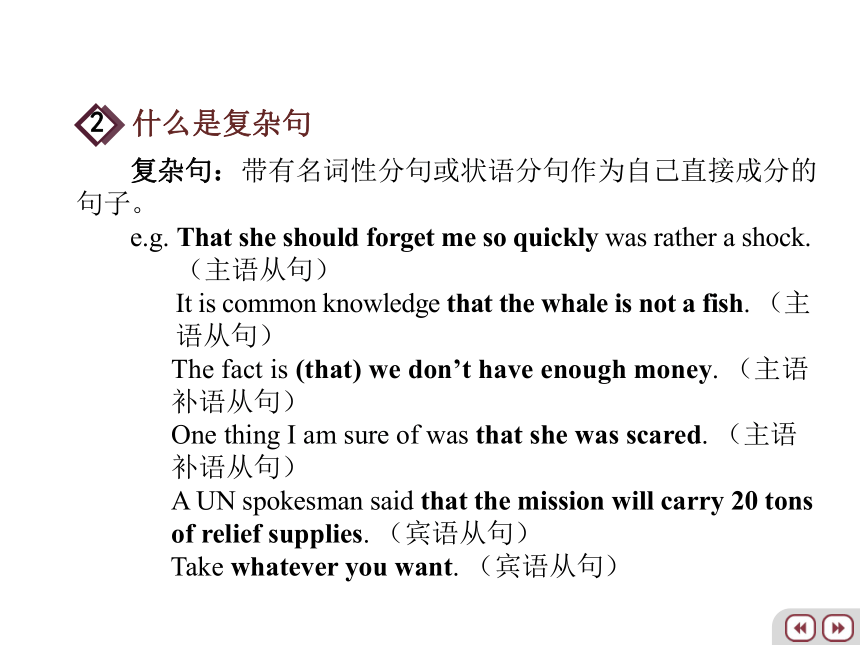
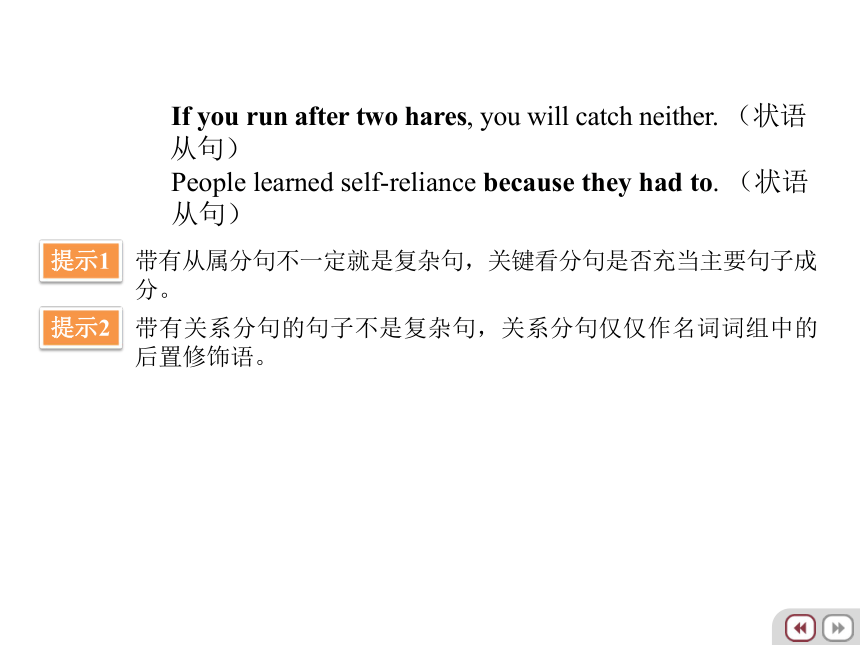
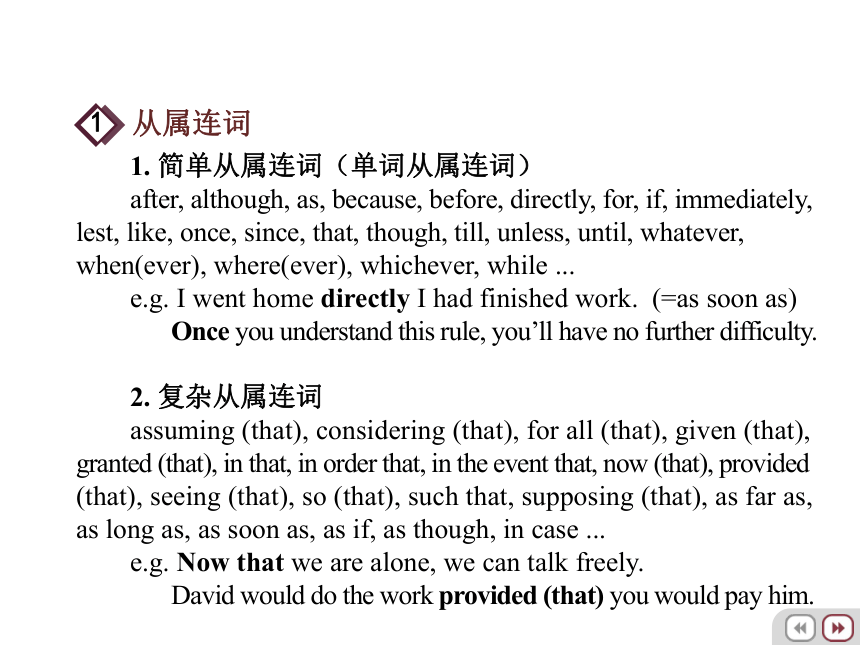
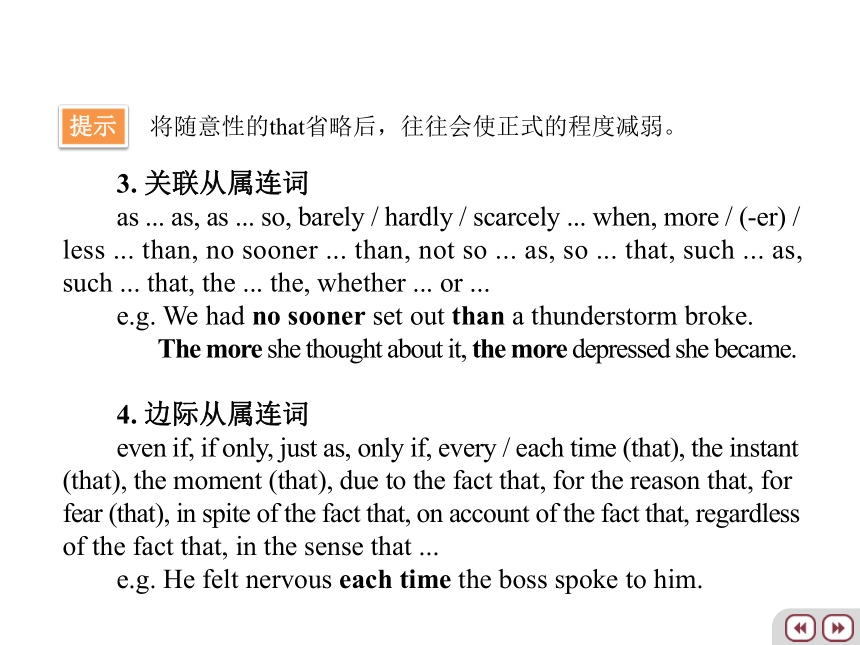
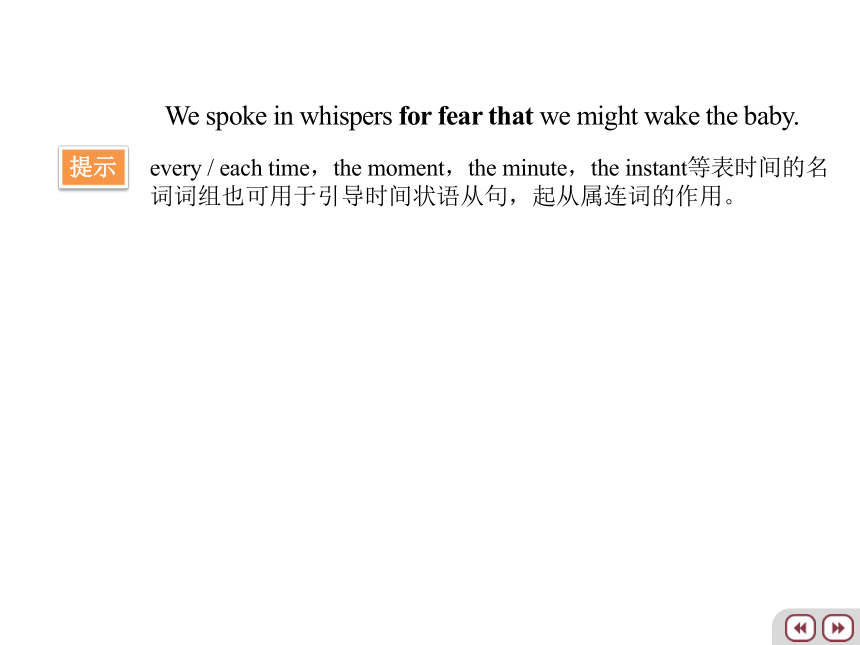
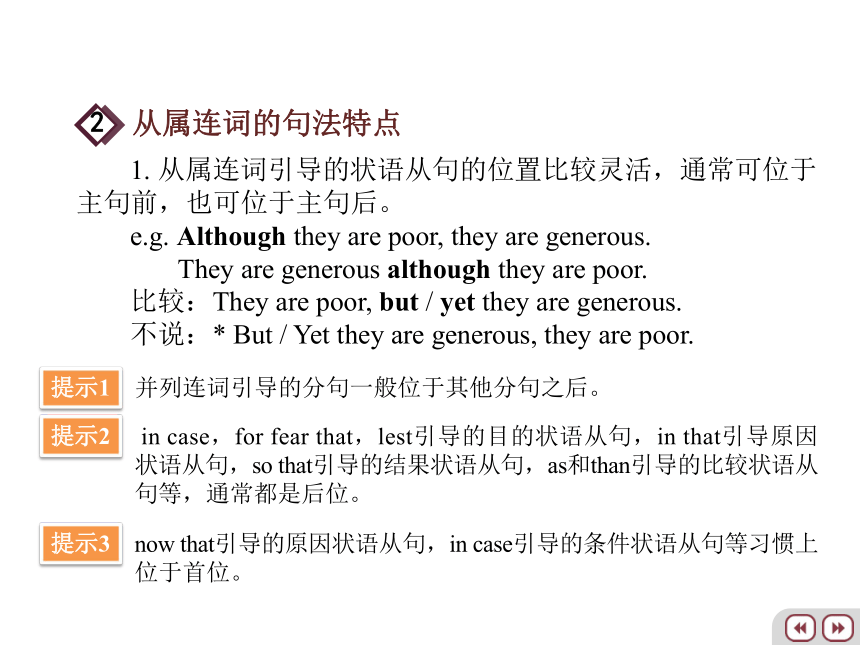
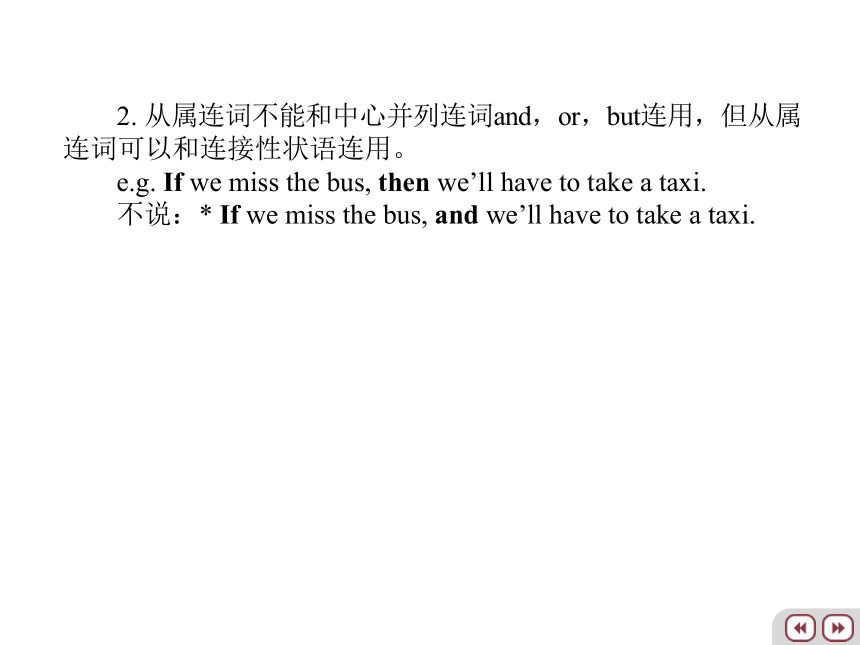

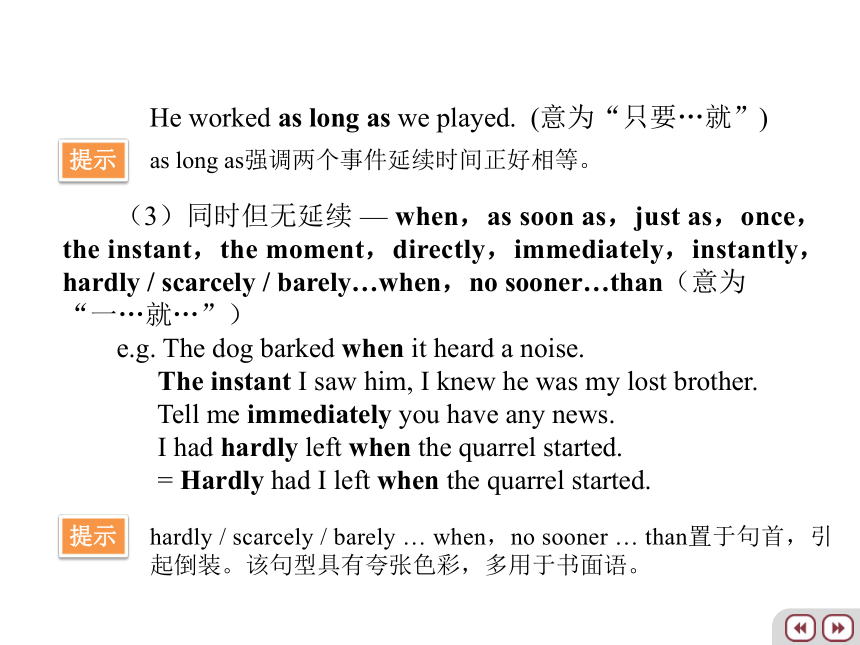
文档简介
(共59张PPT)
1. 从属结构
一个语法结构含有同一层次甚至高一层次的结构为其直接成分,就形成了从属关系,从属于其他语法结构的结构叫做“从属结构”。
e.g. Shakespeare the great dramatist (词组从属于词组)
a man of great charm and distinction(词组从属于词组)
the house where Chairman Mao once lived(分句从属
于词组)
Wilbur, who was asleep in the straw(分句从属于词组)
Make hay while the sun shines. (分句从属于分句)
When in Rome, do as the Romans do. (分句从属于
分句)
什么是从属结构
1
名词词组可能只由一个中心词构成。
提示
2. 从属分句
从属分句
非限定分句
限定从属分句
无动词分句
名词性分句
形容词性分句
副词性分句
不定式分句
-ing
分词分句
-ed
分词分句
e.g. Don’t claim to know what you don’t know. (名词性分句)
Nothing is impossible to the man who will try. (形容词
性分句)
Where there is a will, there is a way. (副词性分句)
To avoid criticism, do nothing, say nothing, be nothing.
(不定式分句)
Looking from the hill, you think the opposite hill is higher.
(-ing分词分句)
Born into a poor family, he had only two years of schooling.
(-ed分词分句)
“You know painters, then ” she asked, her eyes full of interest.
(无动词分句)
形容词性分句就是关系分句,副词性分句就是状语分句。
非限定分句和无动词分句不一定带有从属连词。
提示1
提示2
复杂句:带有名词性分句或状语分句作为自己直接成分的句子。
e.g. That she should forget me so quickly was rather a shock.
(主语从句)
It is common knowledge that the whale is not a fish. (主
语从句)
The fact is (that) we don’t have enough money. (主语
补语从句)
One thing I am sure of was that she was scared. (主语
补语从句)
A UN spokesman said that the mission will carry 20 tons
of relief supplies. (宾语从句)
Take whatever you want. (宾语从句)
什么是复杂句
2
If you run after two hares, you will catch neither. (状语
从句)
People learned self-reliance because they had to. (状语
从句)
带有从属分句不一定就是复杂句,关键看分句是否充当主要句子成分。
带有关系分句的句子不是复杂句,关系分句仅仅作名词词组中的后置修饰语。
提示1
提示2
从属连词
1
1. 简单从属连词(单词从属连词)
after, although, as, because, before, directly, for, if, immediately, lest, like, once, since, that, though, till, unless, until, whatever, when(ever), where(ever), whichever, while ...
e.g. I went home directly I had finished work. (=as soon as)
Once you understand this rule, you’ll have no further difficulty.
2. 复杂从属连词
assuming (that), considering (that), for all (that), given (that), granted (that), in that, in order that, in the event that, now (that), provided (that), seeing (that), so (that), such that, supposing (that), as far as, as long as, as soon as, as if, as though, in case ...
e.g. Now that we are alone, we can talk freely.
David would do the work provided (that) you would pay him.
3. 关联从属连词
as ... as, as ... so, barely / hardly / scarcely ... when, more / (-er) / less ... than, no sooner ... than, not so ... as, so ... that, such ... as, such ... that, the ... the, whether ... or ...
e.g. We had no sooner set out than a thunderstorm broke.
The more she thought about it, the more depressed she became.
4. 边际从属连词
even if, if only, just as, only if, every / each time (that), the instant (that), the moment (that), due to the fact that, for the reason that, for fear (that), in spite of the fact that, on account of the fact that, regardless of the fact that, in the sense that ...
e.g. He felt nervous each time the boss spoke to him.
将随意性的that省略后,往往会使正式的程度减弱。
提示
We spoke in whispers for fear that we might wake the baby.
every / each time,the moment,the minute,the instant等表时间的名词词组也可用于引导时间状语从句,起从属连词的作用。
提示
1. 从属连词引导的状语从句的位置比较灵活,通常可位于主句前,也可位于主句后。
e.g. Although they are poor, they are generous.
They are generous although they are poor.
比较:They are poor, but / yet they are generous.
不说:* But / Yet they are generous, they are poor.
从属连词的句法特点
2
并列连词引导的分句一般位于其他分句之后。
in case,for fear that,lest引导的目的状语从句,in that引导原因状语从句,so that引导的结果状语从句,as和than引导的比较状语从句等,通常都是后位。
提示1
提示2
now that引导的原因状语从句,in case引导的条件状语从句等习惯上位于首位。
提示3
2. 从属连词不能和中心并列连词and,or,but连用,但从属连词可以和连接性状语连用。
e.g. If we miss the bus, then we’ll have to take a taxi.
不说:* If we miss the bus, and we’ll have to take a taxi.
1. when,while,as,before,after,until等的用法比较
A. 同时性:when,whenever,while
(1 )同时且重复 — when, whenever (意为“每当…的时候”
e.g. When / Whenever he goes to town, he visits his aunt.
= If / Every time he goes to town, he visits his aunt.
She felt ill when / whenever she ate oyster.
(2)同时且延续 — when,while (意为“当…的时候”)
e.g. The wind blew hard when the rain poured down.
I cooked the dinner while he played the piano.
= I was cooking the dinner while he was playing the piano.
(进行体突出持续性)
若干语义相关的从属连词之用法比较
3
主句动词和时间状语分句动词都用一般现在时,或都用一般过去时,分别表示现在或过去的习惯动作。
提示
He worked as long as we played. (意为“只要…就”)
(3)同时但无延续 — when,as soon as,just as,once,the instant,the moment,directly,immediately,instantly,hardly / scarcely / barely…when,no sooner…than(意为“一…就…”)
e.g. The dog barked when it heard a noise.
The instant I saw him, I knew he was my lost brother.
Tell me immediately you have any news.
I had hardly left when the quarrel started.
= Hardly had I left when the quarrel started.
as long as强调两个事件延续时间正好相等。
提示
hardly / scarcely / barely … when,no sooner … than置于句首,引起倒装。该句型具有夸张色彩,多用于书面语。
提示
(4)主句动作发生在从句动作的过程中 — while, when, as
e.g. I broke a glass while I was cooking the dinner.
The waiter spilt soup over me when he was serving / served
me.
I met Mary as I was going / went home.
(5)从句动作发生在主句动作的过程中 — when (意为“在…时突然…”)
e.g. I was cooking the dinner when I broke a glass.
= I was cooking the dinner, and at that time I broke a glass.
从句动作可用进行体或非进行体。
较长的动作用过去进行体,较短的动作用一般过去时。
提示1
提示2
主句动作要用进行体,when-分句必定位于句末,以产生一种强调的戏剧性高潮。
提示
B. 先时性和后时性:before,after,when,till / until,since
e.g. When I reached the station, the train had left.
I reached the station after the train (had) left.
The train (had) left before I reached the station.
I didn’t reach the station until the train had left.
Since he joined the army, he has made great progress.
2. because,for,since,as,now that等的用法比较
A. because,for的异同
相同点:都可表示“直接理由”和“间接理由”。
e.g. We hurried because / for it was getting dark. (“直接理
由”)
通常是until / till-分句动作在前,主句动作在后。
通常是since-分句动作在前,主句动作在后;since意为“从…以来”,从句用一般过去时,主句通常用现在完成体。
提示1
提示2
It must be very late, because / for the streets are quite deserted.
(“间接理由”)
不同点:
① because位置灵活,常置于主句之后,为了强调也可置于主句之前;for只能置于主句之后。
e.g. The doctor looks tired and sleepy because he sat up all night
with the patient.
Because he sat up all night with the patient, the doctor looks
tired and sleepy.
The doctor looks tired and sleepy, for he sat up all night with
the patient.
表直接原因时because更常用,because比for语势更强。
表间接原因时because,for只能置于主句之后,在口语中有停顿,书写中用逗号分隔。
提示1
提示2
② because可单独回答why-问句,而for-分句不可以。
e.g. —Why does the doctor look so tired and sleepy
—Because he sat up all night with the patient.
③ because-分句可在because之前带否定词或其他修饰语,带某些并列连词,而for-分句不可。
e.g. The doctor looks tired and sleepy simply because he sat up
all night with the patient.
The doctor looks tired and sleepy not because he isn’t feeling
well, but because he sat up all night with the patient.
④ because-分句可作分裂句中心成分,而for-分句不可。
e.g. It is because he sat up all night with the patient that the doctor
looks tired and sleepy.
把握好这些不同点的关键在于了解两者的语势不同,because语势最强,通常表示“新信息”。
提示1
B. because,since,as
① 语势强弱不同:because > since > as
② 未知原因:because
已知原因:since,as
e.g. She didn’t want to go to Africa, probably because the weather is too hot.
As you are busy, you need not go with me.
Since you do not understand, I will explain again.
for之所以采取后位是因为for接近于并列连词,所说的理由是一种补充说明,这点类似于并列连词and的用法。
提示2
since- / as-常用以提供背景,多位于句首,可译为“既然;因为”。
since/as和because一样,不能和so同时使用,比如,不能说“*As you are busy, so you need not go with me.”。
提示1
提示2
since- / as-分句不可单独回答why-问句,也不可作分裂句中心成分。
提示3
C. in that,now (that),seeing (that)
① in that用于正式文体,从一方面或几方面说明理由,只能取后位,意为“原因是;在于”。
e.g. Theory is valuable in that it can provide a direction for
practice.
② now that表已知原因,常位于句首。主要用于说明一种新情况,主从句因果关系很小,意为“既然;由于”,且含有时间意义,可用于现在时和过去时,不用于表将来时间。
e.g. We are happy now that everybody is present.
Now that she could drive, she felt independent.
③ seeing that表已知原因,意义相当于in view of the fact that,意为“鉴于;由于”,有时可与since / as / now that互换使用。
e.g. Now that / Seeing that / Since / As we are all here, the
meeting can begin.
①* As he reads fast, he can’t finish the book in two days.
②* I took a walk when I came across an old friend of mine.
③* Because the rain has stopped, let’s continue to work.
① Fast as he reads, he can’t finish the book in two days. √
或 Although / Though he reads fast, he can’t finish the book in two days. √
② I was taking a walk when I came across an old friend of mine. √
③ Now that / Since the rain has stopped, let’s continue to work. √
典型错误
4
备注
无动词分句:基本属于SVC句型的省略结构,只是动词不表示出来,主语也通常不表示出来,但仍可分析分句成分的分句。
e.g. Whether right or wrong, at least you know where we stand.
(=Whether you are right or wrong)
无动词分句
1
分句中省去的动词是BE的某种形式,逻辑主语通常是主句主语。
提示
1. 不带从属连词的无动词分句
e.g. Speechless, Victor Henry nodded and sat on a folding seat.
(形容词词组)
Anxious for a quick decision, the chairman called for a vote.
(形容词词组)
An excellent speaker, he was never at a loss for words.
(名词词组)
Bank loan or no bank loan, we’ll buy the house.
(名词词组)
结构模式
2
深层结构上属于SVC句型中形容词词组或名词词组作主语补语的情形。
提示
之所以带从属连词是为了使逻辑关系更加清晰,避免语义模糊或歧义。
提示
even if, once, unless, until, when(ever), where(ever), whether ...
or, while, whatever, no matter what, however ...
e.g. Whatever the reason, his cordiality to her has won him a
friend. (从属连词+名词词组)
(=Whatever the reason may be)
Although always helpful, he was not much liked by people.
(从属连词+形容词词组)
When in Rome, do as the Romans do.
(从属连词+介词词组)
He spoke ungraciously, if not rudely.
(从属连词+副词词组)
2. 带从属连词的无动词分句
从属连词:although, though, as if, as though, as soon as, if,
深层结构上属于SVC句型中作主语补语的四种情形。
提示
3. 带主语的无动词分句
e.g. Two hundred people died in the accident, many of them
children. (逻辑主语+名词词组)
He looked up, annoyance on his face. (逻辑主语+介词
词组)
Miriam looked at Harry, his eyes full of doubt and discomfort.
(逻辑主语+形容词词组)
Breakfast over, he went to his counting house. (逻辑主
语+副词词组)
1. 作修饰性状语
(1)表示时间
e.g. You must eat it when fresh.
Whenever in doubt, see me.
(2)表示地点
e.g. The cardboard is light-proof where thick.
Wherever possible, all moving parts should be tested.
(3)表示方式或伴随状况
e.g. She stood there, speechless.
There he stood, a tray in each hand.
(4)表示原因
e.g. A man of integrity, he would keep his word, I am certain.
The men stared at the floor, too nervous to reply.
句法功能
3
(5)表示条件
e.g. It has little tastes, unless hot.
If wet, the pipe won’t give you a good smoke.
(6)表示让步
e.g. Although a physicist by training, he became a great statesman.
Well or sick, calm or worried, she is always restrained in
her expression.
2. 作评注性状语
e.g. More important, he showed us that if you want to be
successful in any endeavor, particularly investing, you
need to keep an open mind and be willing to learn.
无动词分句的逻辑主语不是主句的主语,而是整个主句的内容。
提示
3. 作连接性状语
e.g. She was tired and hungry. Her car was low on fuel. Worst of all, her cell phone hadn’t worked for miles.
4. 作名词修饰语
e.g. His hands, numb from the cold, could not find the key.
(=His hands, which were numb from the cold, could not
find the key.)
A fellow Georgian, Jordan was well-known as a friend of
the President.
(=Jordan, who was a fellow Georgian, was well-known
as a friend of the President.)
作连接性状语的无动词分句有时也具有评注性状语的性质。
提示
通常相当于一个非限制性关系分句,提供补充信息。
提示
1. “独立结构”的实质
实质:带有自己主语的非限定分句和无动词分句。
e.g. Time permitting, we shall start tomorrow.
He went off, gun in hand.
2. “独立结构”的类型
四种类型:
不定式“独立结构”
-ing分词“独立结构”
-ed分词“独立结构”
无动词“独立结构”
“独立结构”的实质
1
独立结构的逻辑主语与主句的主语不同。
独立结构是一种从属分句,通常起状语分句的作用。
提示1
提示2
独立结构与主句之间不能使用任何连接词。
提示3
-ing分词“独立结构”谓语动词是being时,being可省略,即成为无动词“独立结构”。
e.g.
[1] A number of officials followed the emperor, some to hold
his robe, others to adjust his girdle, and so on.
(不定式“独立结构”)
[2] There being nothing else to do, we left.
(-ing分词“独立结构”)
[3] His voice drowned by the noise, the speaker interrupted his
lecture. (-ed分词“独立结构”)
[4] The meeting over, all of them went back to work.
(无动词“独立结构”)
[5] The floor (being) wet and slippery, we stayed outside.
(-ing分词“独立结构”/ 无动词“独立结构”)
现代英语中,更常见的是-ing分词“独立结构”或-ed分词“独立结构”,不定式“独立结构”现在已经很少见了。
提示1
提示2
3. 四种“独立结构”的区别
不定式“独立结构” 往往用于将要发生的事情
-ing分词“独立结构” 通常表示正在进行的动作,主语与-ing分词之间为主动关系
-ed分词“独立结构” 通常表示已发生的动作,主语与-ed分词之间为被动关系
无动词“独立结构” 省略了BE动词的SVC句型,补充说明主语的情况
1. “独立结构”的用法特点
(1)与主句之间通常用逗号隔开,有时也用破折号
e.g. The room was in chaos — dirty clothes strewn on the floor,
cosmetics scattered over the dresser, empty bottles and
cans everywhere.
(2)作主语的名词词组有时可省略限定词
e.g. The manager sat quietly in the office, (his) eyes closed.
(3)位置较灵活,可位于句首、句中或句尾
e.g. All things considered, I think I ought to award the job to
Smith. (句首)
“You know painters, then ” she asked, her eyes full of
interest. (句尾)
“独立结构”的用法和意义
2
Every Saturday morning — weather permitting — he mowed
the lawn. (句中)
(4)含有几个“独立结构”时,常把概括意义的结构置于最后
e.g. The professor was slammed against the wall, his body frisked,
his wrists handcuffed, his dignity lost.
(5)“独立结构”常见于正式语体,特别是文学体裁,在口语中较为罕见。
e.g. I was born in the year 1632, in the city of York, of a good
family, though not of that country, my father being a
foreigner of Bremen, who settled first at Hull. —Robinson
Crusoe
“独立结构”是文学语言常见的修辞手法,能使句子结构紧凑,用词精炼,描写生动。
提示
2. “独立结构”的意义
(1)表示时间
e.g. His homework done, Jim decided to go and see the play.
(=After his homework was done, Jim ...)
(2)表示原因
e.g. The last bus having gone, we had to walk home.
(=Because the last bus had gone, we ...)
(3)表示条件
e.g. All things being equal, a person with a PhD should be getting
a higher salary than someone with only a master’s degree.
(=If all things are equal, a person with a PhD ...)
(=...with the wrong side out.)
Richard went ahead, hands in pockets.
(=...with his hands in the pockets.)
表方式和伴随状况的“独立结构”通常可变为由with / without(否定意义时)引导的介词词组,用于口语中。
提示
(4)表示方式和伴随状况
e.g. He put on his socks wrong side out.
Protocol was enabled him to make difficult decisions without ever looking back.
A.
B.
C.
D.
who
what
which
that
该题考查what引导的名词性从句作主语补语的用法。该句was是系动词,其后为名词性从句,该从句缺少主语,根据句意判断这里需要一个表达“所…的(事物)”含义的连接代词,因此B项what为正确答案。who指人,which意为“哪一个”,that在名词性从句中无词汇意义,它们均不正确。protocol意为“协议”,without looking back意为“毫不犹豫地”。
正是协议书让他能够毫不犹豫地做出艰难的决定。
________ combination of techniques authors use, all stories — from the briefest anecdotes to the longest novels — have a plot.
A.
B.
C.
D.
Regarding
Whatever
In so far as
No matter
该题考查让步状语从句的引导词。根据句意可知,两个分句之间的逻辑关系表让步,且combination之前缺少修饰语,whatever意为“无论什么样的”,可以引导让步状语从句,同时可作修饰语,因此B为正确答案。介词regarding不能用作从属连词,in so far as“到…的程度;在…的范围”只能引导表程度的状语从句,no matter后面须接what / how / when等词才能引导状语从句。注意:whatever分句中的动词be有时可以省略,例如:Whatever your reason (is), we have a suitable exam or test for you.。
无论作者使用了什么样的技巧组合,所有的故事——从最简单的趣闻轶事到最长的小说——都会有一个情节。
The research team can handle ________ needs to be handled.
A.
B.
C.
D.
whenever
whichever
wherever
whatever
该题考查名词性从句的引导词。题干中主句的谓语动词handle为及物动词,后需接宾语,而从句中又缺少主语,因此需要填一个既能引导宾语从句,又能在从句中作主语的连接词,whatever正符合这一要求,whatever意为“所…的”,因此,D为正确答案。注意:虽然whichever有时也可在名词性从句中充当主语,但此时whichever必然有个范围,比如“Whichever of us gets home first starts cooking.”。
这个研究团队能解决任何需要解决的问题。
Fool ________ Michael is, he could not have done such a thing.
A.
B.
C.
D.
who
as
that
like
该题考查as引导的让步状语从句的前置结构。根据前后分句的逻辑语义关系可知,前一分句应表达让步含义,意思是“尽管迈克尔很愚蠢”,由于该句缺少连接词且形容词置于句首,可以判断该句是as引导的让步状语从句。as引导让步状语从句时,形容词或名词要前置,主、谓语不倒装,因此B为正确答案。注意:在该前置结构中,名词前不带冠词,相当于“Though Michael is a fool, …”,但用前置结构语气要重。
虽说迈克尔很愚蠢,但他不可能做出这种事来。
Which of the italicized parts functions as a subject
A.
B.
C.
D.
We never doubt that her brother is honest.
The problem is not who will go but who will stay.
You must give it back to whoever it belongs to.
It is clear that the crime was done deliberately.
该题考查限定从属分句的句法功能。A中斜体部分为that引导的宾语从句,作doubt的宾语;B中斜体部分为who引导的主语补语从句,作is的主语补语;C中斜体部分为whoever引导的宾语从句,作介词to的补足成分;D中斜体部分为that引导的主语从句,作句子真正的主语,it为形式主语,因此D为正确答案。
下列哪句中的斜体部分作主语?
Which of the following contains an adverbial clause of cause
A.
B.
C.
D.
I got a job as soon as I left university.
As there was no answer, I wrote again.
You must do the exercises as I show you.
Wealthy as he is, Mark is not a happy man.
该题考查as引导的从属连词的辨析。A句意为“我一毕业就找到了工作”,含有as soon as引导的时间状语从句;C句意为“你必须按照我教给你的方法做练习”,含有as引导的方式状语从句;D句意为“尽管马克很富有,但他不是一个快乐的人”,含有as引导的让步状语从句。B项意为“由于没有接到回信,我就又写了封信”,含有as引导的原因状语从句,因此B为正确答案。
下面哪句中含有一个原因状语从句?
The couple had no sooner got to the station _______ the coach left.
A.
B.
C.
D.
when
as
until
than
该题考查关联从属连词no sooner … than …的用法。no sooner … than …为固定搭配,意为“刚刚…就…”,注意它与hardly / scarcely … when ...的搭配区别。因此D为正确答案。
这对夫妇刚到车站教练就离开了。
Men differ from animals ______ they can think and speak.
A.
B.
C.
D.
for which
for that
in that
in which
该题考查in that引导的原因状语从句的用法。该句不是“介词+关系代词”引导的关系分句,因为介词for,in与前面的名词及后面的动词都不构成搭配,A、D均不正确。for that不能引导从句。in that引导原因状语分句,意为“之所以…,就在于…”,相当于for the reason that,because,只取中位。前后分句之间含有因果关系,因此C为正确答案。
人之所以不同于动物,就在于人会思考和说话。
______ dull he may be, he is certainly a very successful top executive.
A.
B.
C.
D.
Although
Whatever
As
However
该题考查however引导的让步状语从句的用法。连接副词however引导让步状语从句时,后紧接形容词或副词,表示对形容词或副词的强调。although引导让步状语从句时,则应使用正常语序Although he may be dull;as引导让步状语从句的语序应为Dull as he may be;whatever引导让步状语从句时,后接名词词组,所以A、B、C均不对。因此D为正确答案。
不管他多么无趣,他无疑仍是一位非常成功的高管。
Agriculture is the country’s chief source of wealth, wheat ______ by far the biggest cereal crop.
A.
B.
C.
D.
is
been
be
being
该题考查-ing分词独立结构的用法。如果选A,C从形式上看,该句既不是并列句,也不是复杂句,因而都不对。wheat being by far the biggest cereal crop为“逻辑主语+-ing分词分句”的独立结构,在句中作状语,表补充情况。逻辑主语wheat和逻辑谓语being是主动关系,因此D为正确答案。
农业是该国的主要财富来源,其中小麦是目前为止最重要的粮食作物。
英语是一种结构性的语言,从属结构是英语最重要的特点之一,在英语构句中具有重要地位。本讲主要介绍了从属结构和复杂句,从属连词的分类,若干语义相关的从属连词的用法比较,带名词性分句、状语分句、非限定分句的复杂句,带无动词分句的复杂句,“独立结构”的实质和类型、用法和意义。
学习中首先理解什么是从属结构,在此基础上理解复杂句的各种类型。带有从属分句的句子不一定都是复杂句,关系分句是分句从属于词组,不构成复杂句,带有名词性分句或状语分句作为自己直接成分的句子才是复杂句,复杂句还包括带有非限定分句的句子、带有无动词分句的句子。从属结构的学习还需熟悉常见的各类从属连词,从属连词确定着
主句和从句之间的各种语义关系,复杂句中从属连词的选择是学习难点之一,需要根据主、从句之间的逻辑语义关系作出恰当选择。无动词分句基本上属于SVC句型的省略结构,这有助于理解无动词分句的结构模式,无动词分句可在句中作名词修饰语和各种状语。“独立结构”的实质是带有自己的主语的非限定分句和无动词分句,通常在句中起状语的作用,表示时间、原因、条件、方式和伴随状况。“独立结构”常见于正式语体,是文学语言常见的修辞手法,能使句子结构紧凑,用词精炼,描写生动,形象具体。
1.
2.
3.
4.
I saw a film yesterday. The film was dull.
The weather keeps fine. I see no reason why the village fete (游园会) should not be a success.
A German is coming to see me. I made his acquaintance in Hamburg last year.
She spoke French rapidly. I couldn’t understand her.
The film I saw yesterday was dull.
If / Provided that the weather keeps fine, I see no reason why the village fete should not be a success.
A German whose acquaintance I made in Hamburg last year is coming to see me.
Because / As she spoke French rapidly, I couldn’t understand her.
5.
6.
7.
I lost my pen somewhere. The auditorium might be the place.
He came out of the Conference Room. Reporters surrounded him.
His mother waited up. He came home.
The auditorium might be the place where I lost my pen.
When / As he came out of the Conference Room, he was surrounded by reporters.
His mother waited up until he came home.
1.
2.
3.
4.
5.
6.
7.
8.
_________________________ he did, no one paid any attention to him.
______ I understand what you say, I can’t agree with you.
Tall __________ he was, he could not reach the apples.
________ all the world were against me, I should still hold to my opinion.
It rained a lot, ________ I didn’t have to water the lawn.
The speech is all the more important ________ it was made by a man of authority.
Please do exactly ________ your doctor says.
_________________ there’s plenty of sun and rain, the fields are green.
No matter what / Whatever
While
as / though
Though
so that
in that
as
Where / Wherever
9.
10.
He walks ________ he were drunk.
_____________________ had he arrived ________ he
had to leave again.
as if
Hardly / Scarcely / Barely
when
No sooner
than
1.
2.
3.
4.
5.
6.
He told me to drive carefully.
She insisted on our going there on foot.
He made me answer all the questions.
They asked us to sit down and have a cup of tea.
The rules require players to wear tennis shoes on the court.
The boss wants his secretary to learn shorthand.
He urged that I drive carefully.
She insisted that we go there on foot.
He demanded that I answer all the questions.
They requested that we sit down and have a cup of tea.
The rules require that players wear tennis shoes on the court.
The boss suggests that his secretary learn shorthand.
7.
The captain ordered the crew to abandon ship.
The captain ordered that the crew abandon ship.
1.
2.
3.
4.
The men were eager to begin the climb and they rose at first light.
The summit, which was bare and black, towered above them.
They were thoroughly exhausted as they crawled into their sleeping bags.
When the snow was fresh, it afforded no sure foothold.
Eager to begin the climb, the men rose at first light.
The summit, bare and black, towered above them.
Thoroughly exhausted, they crawled into their sleeping bags.
Rewrite the following, using verbless clauses where possible.
When fresh, the snow afforded no sure foothold.
5.
6.
7.
The rescue party brought them down to the base camp: they were half-dead with the cold.
Although he was a lawyer by training, he became a great soldier.
We shall continue our policy, whatever your objections may be.
The rescue party brought them down to the base camp,
half-dead with the cold./ Half-dead with the cold, they
were brought down to the base camp by the rescue party.
Although / Though a lawyer by training, he became a great soldier.
We shall continue our policy, whatever your objections.
8.
9.
Mrs Serafino went down to wake up the girl because she was angry with her for oversleeping.
Being a notorious burglar, Bob Rand found it easy to force open the lock.
Angry with the girl for oversleeping, Mrs. Serafino went down to wake her up.
A notorious burglar, Bob Rand found it easy to force open the lock. /
Bob Rand, a notorious burglar, found it easy to force open the lock.
10.
As if this had happened by previous arrangement, she came to the palace from Deptform by water, while Leicester arrived by land.
As if by previous arrangement, she came to the palace from Deptform by water, while Leicester arrived by land.
1.
2.
3.
4.
a. She stood back and looked at him.
b. Her face smiled radiantly.
a. His exam was finished.
b. Porter stumbled wearily out of the room.
a. Dinner was over.
b. The family scattered to their various haunts.
a. The meeting was closed.
b. Nobody had any more to say.
She stood back and looked at him, her face smiling radiantly.
His exam finished, Porter stumbled wearily out of the room.
Dinner over, the family scattered to their various haunts.
Nobody having any more to say, the meeting was closed.
5.
6.
7.
a. There was no way for me to cross.
b. I walked upstream on the south side.
a. James sat down.
b. He wiped his forehead and smiled complacently.
c. His good humour was quite restored.
a. All the money had been spent.
b. Jack started looking for work.
There being no way for me to cross, I walked upstream on the south side.
James sat down, wiped his forehead and smiled complacently, his good humour quite restored.
All the money having been spent, Jack started looking for work.
8.
9.
10.
a. Hilda marched stiffly from the room.
b. Her face was blazing with anger.
a. Walking into the room, I saw Grandpa.
b. He was sitting at the desk.
c. His newspaper was spread before him.
a. The professor rested against the blackboard.
b. Chalk was held in one hand.
c. The textbook was held in the other hand.
Hilda marched stiffly from the room, her face blazing with anger.
Walking into the room, I saw Grandpa sitting at the desk, newspaper spread before him.
The professor rested against the blackboard, chalk in one hand, textbook in the other.
11.
12.
a. I made my way to the Chevy pickup (敞篷小货车).
b. The pickup was parked in front of the store.
c. I was carrying packages under my arm.
d. I was holding maps in my hand.
a. The prisoner stood quietly on the wooden platform.
b. A small cotton bag was put over his face.
c. His hands were tied behind his back.
d. A noose was fixed securely about his neck.
Packages under arm, maps in hand, I made my way to the Chevy pickup parked in front of the store.
A small cotton bag over his face, hands tied behind his back, a noose fixed securely about his neck, the prisoner stood quietly on the wooden platform.
1. 从属结构
一个语法结构含有同一层次甚至高一层次的结构为其直接成分,就形成了从属关系,从属于其他语法结构的结构叫做“从属结构”。
e.g. Shakespeare the great dramatist (词组从属于词组)
a man of great charm and distinction(词组从属于词组)
the house where Chairman Mao once lived(分句从属
于词组)
Wilbur, who was asleep in the straw(分句从属于词组)
Make hay while the sun shines. (分句从属于分句)
When in Rome, do as the Romans do. (分句从属于
分句)
什么是从属结构
1
名词词组可能只由一个中心词构成。
提示
2. 从属分句
从属分句
非限定分句
限定从属分句
无动词分句
名词性分句
形容词性分句
副词性分句
不定式分句
-ing
分词分句
-ed
分词分句
e.g. Don’t claim to know what you don’t know. (名词性分句)
Nothing is impossible to the man who will try. (形容词
性分句)
Where there is a will, there is a way. (副词性分句)
To avoid criticism, do nothing, say nothing, be nothing.
(不定式分句)
Looking from the hill, you think the opposite hill is higher.
(-ing分词分句)
Born into a poor family, he had only two years of schooling.
(-ed分词分句)
“You know painters, then ” she asked, her eyes full of interest.
(无动词分句)
形容词性分句就是关系分句,副词性分句就是状语分句。
非限定分句和无动词分句不一定带有从属连词。
提示1
提示2
复杂句:带有名词性分句或状语分句作为自己直接成分的句子。
e.g. That she should forget me so quickly was rather a shock.
(主语从句)
It is common knowledge that the whale is not a fish. (主
语从句)
The fact is (that) we don’t have enough money. (主语
补语从句)
One thing I am sure of was that she was scared. (主语
补语从句)
A UN spokesman said that the mission will carry 20 tons
of relief supplies. (宾语从句)
Take whatever you want. (宾语从句)
什么是复杂句
2
If you run after two hares, you will catch neither. (状语
从句)
People learned self-reliance because they had to. (状语
从句)
带有从属分句不一定就是复杂句,关键看分句是否充当主要句子成分。
带有关系分句的句子不是复杂句,关系分句仅仅作名词词组中的后置修饰语。
提示1
提示2
从属连词
1
1. 简单从属连词(单词从属连词)
after, although, as, because, before, directly, for, if, immediately, lest, like, once, since, that, though, till, unless, until, whatever, when(ever), where(ever), whichever, while ...
e.g. I went home directly I had finished work. (=as soon as)
Once you understand this rule, you’ll have no further difficulty.
2. 复杂从属连词
assuming (that), considering (that), for all (that), given (that), granted (that), in that, in order that, in the event that, now (that), provided (that), seeing (that), so (that), such that, supposing (that), as far as, as long as, as soon as, as if, as though, in case ...
e.g. Now that we are alone, we can talk freely.
David would do the work provided (that) you would pay him.
3. 关联从属连词
as ... as, as ... so, barely / hardly / scarcely ... when, more / (-er) / less ... than, no sooner ... than, not so ... as, so ... that, such ... as, such ... that, the ... the, whether ... or ...
e.g. We had no sooner set out than a thunderstorm broke.
The more she thought about it, the more depressed she became.
4. 边际从属连词
even if, if only, just as, only if, every / each time (that), the instant (that), the moment (that), due to the fact that, for the reason that, for fear (that), in spite of the fact that, on account of the fact that, regardless of the fact that, in the sense that ...
e.g. He felt nervous each time the boss spoke to him.
将随意性的that省略后,往往会使正式的程度减弱。
提示
We spoke in whispers for fear that we might wake the baby.
every / each time,the moment,the minute,the instant等表时间的名词词组也可用于引导时间状语从句,起从属连词的作用。
提示
1. 从属连词引导的状语从句的位置比较灵活,通常可位于主句前,也可位于主句后。
e.g. Although they are poor, they are generous.
They are generous although they are poor.
比较:They are poor, but / yet they are generous.
不说:* But / Yet they are generous, they are poor.
从属连词的句法特点
2
并列连词引导的分句一般位于其他分句之后。
in case,for fear that,lest引导的目的状语从句,in that引导原因状语从句,so that引导的结果状语从句,as和than引导的比较状语从句等,通常都是后位。
提示1
提示2
now that引导的原因状语从句,in case引导的条件状语从句等习惯上位于首位。
提示3
2. 从属连词不能和中心并列连词and,or,but连用,但从属连词可以和连接性状语连用。
e.g. If we miss the bus, then we’ll have to take a taxi.
不说:* If we miss the bus, and we’ll have to take a taxi.
1. when,while,as,before,after,until等的用法比较
A. 同时性:when,whenever,while
(1 )同时且重复 — when, whenever (意为“每当…的时候”
e.g. When / Whenever he goes to town, he visits his aunt.
= If / Every time he goes to town, he visits his aunt.
She felt ill when / whenever she ate oyster.
(2)同时且延续 — when,while (意为“当…的时候”)
e.g. The wind blew hard when the rain poured down.
I cooked the dinner while he played the piano.
= I was cooking the dinner while he was playing the piano.
(进行体突出持续性)
若干语义相关的从属连词之用法比较
3
主句动词和时间状语分句动词都用一般现在时,或都用一般过去时,分别表示现在或过去的习惯动作。
提示
He worked as long as we played. (意为“只要…就”)
(3)同时但无延续 — when,as soon as,just as,once,the instant,the moment,directly,immediately,instantly,hardly / scarcely / barely…when,no sooner…than(意为“一…就…”)
e.g. The dog barked when it heard a noise.
The instant I saw him, I knew he was my lost brother.
Tell me immediately you have any news.
I had hardly left when the quarrel started.
= Hardly had I left when the quarrel started.
as long as强调两个事件延续时间正好相等。
提示
hardly / scarcely / barely … when,no sooner … than置于句首,引起倒装。该句型具有夸张色彩,多用于书面语。
提示
(4)主句动作发生在从句动作的过程中 — while, when, as
e.g. I broke a glass while I was cooking the dinner.
The waiter spilt soup over me when he was serving / served
me.
I met Mary as I was going / went home.
(5)从句动作发生在主句动作的过程中 — when (意为“在…时突然…”)
e.g. I was cooking the dinner when I broke a glass.
= I was cooking the dinner, and at that time I broke a glass.
从句动作可用进行体或非进行体。
较长的动作用过去进行体,较短的动作用一般过去时。
提示1
提示2
主句动作要用进行体,when-分句必定位于句末,以产生一种强调的戏剧性高潮。
提示
B. 先时性和后时性:before,after,when,till / until,since
e.g. When I reached the station, the train had left.
I reached the station after the train (had) left.
The train (had) left before I reached the station.
I didn’t reach the station until the train had left.
Since he joined the army, he has made great progress.
2. because,for,since,as,now that等的用法比较
A. because,for的异同
相同点:都可表示“直接理由”和“间接理由”。
e.g. We hurried because / for it was getting dark. (“直接理
由”)
通常是until / till-分句动作在前,主句动作在后。
通常是since-分句动作在前,主句动作在后;since意为“从…以来”,从句用一般过去时,主句通常用现在完成体。
提示1
提示2
It must be very late, because / for the streets are quite deserted.
(“间接理由”)
不同点:
① because位置灵活,常置于主句之后,为了强调也可置于主句之前;for只能置于主句之后。
e.g. The doctor looks tired and sleepy because he sat up all night
with the patient.
Because he sat up all night with the patient, the doctor looks
tired and sleepy.
The doctor looks tired and sleepy, for he sat up all night with
the patient.
表直接原因时because更常用,because比for语势更强。
表间接原因时because,for只能置于主句之后,在口语中有停顿,书写中用逗号分隔。
提示1
提示2
② because可单独回答why-问句,而for-分句不可以。
e.g. —Why does the doctor look so tired and sleepy
—Because he sat up all night with the patient.
③ because-分句可在because之前带否定词或其他修饰语,带某些并列连词,而for-分句不可。
e.g. The doctor looks tired and sleepy simply because he sat up
all night with the patient.
The doctor looks tired and sleepy not because he isn’t feeling
well, but because he sat up all night with the patient.
④ because-分句可作分裂句中心成分,而for-分句不可。
e.g. It is because he sat up all night with the patient that the doctor
looks tired and sleepy.
把握好这些不同点的关键在于了解两者的语势不同,because语势最强,通常表示“新信息”。
提示1
B. because,since,as
① 语势强弱不同:because > since > as
② 未知原因:because
已知原因:since,as
e.g. She didn’t want to go to Africa, probably because the weather is too hot.
As you are busy, you need not go with me.
Since you do not understand, I will explain again.
for之所以采取后位是因为for接近于并列连词,所说的理由是一种补充说明,这点类似于并列连词and的用法。
提示2
since- / as-常用以提供背景,多位于句首,可译为“既然;因为”。
since/as和because一样,不能和so同时使用,比如,不能说“*As you are busy, so you need not go with me.”。
提示1
提示2
since- / as-分句不可单独回答why-问句,也不可作分裂句中心成分。
提示3
C. in that,now (that),seeing (that)
① in that用于正式文体,从一方面或几方面说明理由,只能取后位,意为“原因是;在于”。
e.g. Theory is valuable in that it can provide a direction for
practice.
② now that表已知原因,常位于句首。主要用于说明一种新情况,主从句因果关系很小,意为“既然;由于”,且含有时间意义,可用于现在时和过去时,不用于表将来时间。
e.g. We are happy now that everybody is present.
Now that she could drive, she felt independent.
③ seeing that表已知原因,意义相当于in view of the fact that,意为“鉴于;由于”,有时可与since / as / now that互换使用。
e.g. Now that / Seeing that / Since / As we are all here, the
meeting can begin.
①* As he reads fast, he can’t finish the book in two days.
②* I took a walk when I came across an old friend of mine.
③* Because the rain has stopped, let’s continue to work.
① Fast as he reads, he can’t finish the book in two days. √
或 Although / Though he reads fast, he can’t finish the book in two days. √
② I was taking a walk when I came across an old friend of mine. √
③ Now that / Since the rain has stopped, let’s continue to work. √
典型错误
4
备注
无动词分句:基本属于SVC句型的省略结构,只是动词不表示出来,主语也通常不表示出来,但仍可分析分句成分的分句。
e.g. Whether right or wrong, at least you know where we stand.
(=Whether you are right or wrong)
无动词分句
1
分句中省去的动词是BE的某种形式,逻辑主语通常是主句主语。
提示
1. 不带从属连词的无动词分句
e.g. Speechless, Victor Henry nodded and sat on a folding seat.
(形容词词组)
Anxious for a quick decision, the chairman called for a vote.
(形容词词组)
An excellent speaker, he was never at a loss for words.
(名词词组)
Bank loan or no bank loan, we’ll buy the house.
(名词词组)
结构模式
2
深层结构上属于SVC句型中形容词词组或名词词组作主语补语的情形。
提示
之所以带从属连词是为了使逻辑关系更加清晰,避免语义模糊或歧义。
提示
even if, once, unless, until, when(ever), where(ever), whether ...
or, while, whatever, no matter what, however ...
e.g. Whatever the reason, his cordiality to her has won him a
friend. (从属连词+名词词组)
(=Whatever the reason may be)
Although always helpful, he was not much liked by people.
(从属连词+形容词词组)
When in Rome, do as the Romans do.
(从属连词+介词词组)
He spoke ungraciously, if not rudely.
(从属连词+副词词组)
2. 带从属连词的无动词分句
从属连词:although, though, as if, as though, as soon as, if,
深层结构上属于SVC句型中作主语补语的四种情形。
提示
3. 带主语的无动词分句
e.g. Two hundred people died in the accident, many of them
children. (逻辑主语+名词词组)
He looked up, annoyance on his face. (逻辑主语+介词
词组)
Miriam looked at Harry, his eyes full of doubt and discomfort.
(逻辑主语+形容词词组)
Breakfast over, he went to his counting house. (逻辑主
语+副词词组)
1. 作修饰性状语
(1)表示时间
e.g. You must eat it when fresh.
Whenever in doubt, see me.
(2)表示地点
e.g. The cardboard is light-proof where thick.
Wherever possible, all moving parts should be tested.
(3)表示方式或伴随状况
e.g. She stood there, speechless.
There he stood, a tray in each hand.
(4)表示原因
e.g. A man of integrity, he would keep his word, I am certain.
The men stared at the floor, too nervous to reply.
句法功能
3
(5)表示条件
e.g. It has little tastes, unless hot.
If wet, the pipe won’t give you a good smoke.
(6)表示让步
e.g. Although a physicist by training, he became a great statesman.
Well or sick, calm or worried, she is always restrained in
her expression.
2. 作评注性状语
e.g. More important, he showed us that if you want to be
successful in any endeavor, particularly investing, you
need to keep an open mind and be willing to learn.
无动词分句的逻辑主语不是主句的主语,而是整个主句的内容。
提示
3. 作连接性状语
e.g. She was tired and hungry. Her car was low on fuel. Worst of all, her cell phone hadn’t worked for miles.
4. 作名词修饰语
e.g. His hands, numb from the cold, could not find the key.
(=His hands, which were numb from the cold, could not
find the key.)
A fellow Georgian, Jordan was well-known as a friend of
the President.
(=Jordan, who was a fellow Georgian, was well-known
as a friend of the President.)
作连接性状语的无动词分句有时也具有评注性状语的性质。
提示
通常相当于一个非限制性关系分句,提供补充信息。
提示
1. “独立结构”的实质
实质:带有自己主语的非限定分句和无动词分句。
e.g. Time permitting, we shall start tomorrow.
He went off, gun in hand.
2. “独立结构”的类型
四种类型:
不定式“独立结构”
-ing分词“独立结构”
-ed分词“独立结构”
无动词“独立结构”
“独立结构”的实质
1
独立结构的逻辑主语与主句的主语不同。
独立结构是一种从属分句,通常起状语分句的作用。
提示1
提示2
独立结构与主句之间不能使用任何连接词。
提示3
-ing分词“独立结构”谓语动词是being时,being可省略,即成为无动词“独立结构”。
e.g.
[1] A number of officials followed the emperor, some to hold
his robe, others to adjust his girdle, and so on.
(不定式“独立结构”)
[2] There being nothing else to do, we left.
(-ing分词“独立结构”)
[3] His voice drowned by the noise, the speaker interrupted his
lecture. (-ed分词“独立结构”)
[4] The meeting over, all of them went back to work.
(无动词“独立结构”)
[5] The floor (being) wet and slippery, we stayed outside.
(-ing分词“独立结构”/ 无动词“独立结构”)
现代英语中,更常见的是-ing分词“独立结构”或-ed分词“独立结构”,不定式“独立结构”现在已经很少见了。
提示1
提示2
3. 四种“独立结构”的区别
不定式“独立结构” 往往用于将要发生的事情
-ing分词“独立结构” 通常表示正在进行的动作,主语与-ing分词之间为主动关系
-ed分词“独立结构” 通常表示已发生的动作,主语与-ed分词之间为被动关系
无动词“独立结构” 省略了BE动词的SVC句型,补充说明主语的情况
1. “独立结构”的用法特点
(1)与主句之间通常用逗号隔开,有时也用破折号
e.g. The room was in chaos — dirty clothes strewn on the floor,
cosmetics scattered over the dresser, empty bottles and
cans everywhere.
(2)作主语的名词词组有时可省略限定词
e.g. The manager sat quietly in the office, (his) eyes closed.
(3)位置较灵活,可位于句首、句中或句尾
e.g. All things considered, I think I ought to award the job to
Smith. (句首)
“You know painters, then ” she asked, her eyes full of
interest. (句尾)
“独立结构”的用法和意义
2
Every Saturday morning — weather permitting — he mowed
the lawn. (句中)
(4)含有几个“独立结构”时,常把概括意义的结构置于最后
e.g. The professor was slammed against the wall, his body frisked,
his wrists handcuffed, his dignity lost.
(5)“独立结构”常见于正式语体,特别是文学体裁,在口语中较为罕见。
e.g. I was born in the year 1632, in the city of York, of a good
family, though not of that country, my father being a
foreigner of Bremen, who settled first at Hull. —Robinson
Crusoe
“独立结构”是文学语言常见的修辞手法,能使句子结构紧凑,用词精炼,描写生动。
提示
2. “独立结构”的意义
(1)表示时间
e.g. His homework done, Jim decided to go and see the play.
(=After his homework was done, Jim ...)
(2)表示原因
e.g. The last bus having gone, we had to walk home.
(=Because the last bus had gone, we ...)
(3)表示条件
e.g. All things being equal, a person with a PhD should be getting
a higher salary than someone with only a master’s degree.
(=If all things are equal, a person with a PhD ...)
(=...with the wrong side out.)
Richard went ahead, hands in pockets.
(=...with his hands in the pockets.)
表方式和伴随状况的“独立结构”通常可变为由with / without(否定意义时)引导的介词词组,用于口语中。
提示
(4)表示方式和伴随状况
e.g. He put on his socks wrong side out.
Protocol was enabled him to make difficult decisions without ever looking back.
A.
B.
C.
D.
who
what
which
that
该题考查what引导的名词性从句作主语补语的用法。该句was是系动词,其后为名词性从句,该从句缺少主语,根据句意判断这里需要一个表达“所…的(事物)”含义的连接代词,因此B项what为正确答案。who指人,which意为“哪一个”,that在名词性从句中无词汇意义,它们均不正确。protocol意为“协议”,without looking back意为“毫不犹豫地”。
正是协议书让他能够毫不犹豫地做出艰难的决定。
________ combination of techniques authors use, all stories — from the briefest anecdotes to the longest novels — have a plot.
A.
B.
C.
D.
Regarding
Whatever
In so far as
No matter
该题考查让步状语从句的引导词。根据句意可知,两个分句之间的逻辑关系表让步,且combination之前缺少修饰语,whatever意为“无论什么样的”,可以引导让步状语从句,同时可作修饰语,因此B为正确答案。介词regarding不能用作从属连词,in so far as“到…的程度;在…的范围”只能引导表程度的状语从句,no matter后面须接what / how / when等词才能引导状语从句。注意:whatever分句中的动词be有时可以省略,例如:Whatever your reason (is), we have a suitable exam or test for you.。
无论作者使用了什么样的技巧组合,所有的故事——从最简单的趣闻轶事到最长的小说——都会有一个情节。
The research team can handle ________ needs to be handled.
A.
B.
C.
D.
whenever
whichever
wherever
whatever
该题考查名词性从句的引导词。题干中主句的谓语动词handle为及物动词,后需接宾语,而从句中又缺少主语,因此需要填一个既能引导宾语从句,又能在从句中作主语的连接词,whatever正符合这一要求,whatever意为“所…的”,因此,D为正确答案。注意:虽然whichever有时也可在名词性从句中充当主语,但此时whichever必然有个范围,比如“Whichever of us gets home first starts cooking.”。
这个研究团队能解决任何需要解决的问题。
Fool ________ Michael is, he could not have done such a thing.
A.
B.
C.
D.
who
as
that
like
该题考查as引导的让步状语从句的前置结构。根据前后分句的逻辑语义关系可知,前一分句应表达让步含义,意思是“尽管迈克尔很愚蠢”,由于该句缺少连接词且形容词置于句首,可以判断该句是as引导的让步状语从句。as引导让步状语从句时,形容词或名词要前置,主、谓语不倒装,因此B为正确答案。注意:在该前置结构中,名词前不带冠词,相当于“Though Michael is a fool, …”,但用前置结构语气要重。
虽说迈克尔很愚蠢,但他不可能做出这种事来。
Which of the italicized parts functions as a subject
A.
B.
C.
D.
We never doubt that her brother is honest.
The problem is not who will go but who will stay.
You must give it back to whoever it belongs to.
It is clear that the crime was done deliberately.
该题考查限定从属分句的句法功能。A中斜体部分为that引导的宾语从句,作doubt的宾语;B中斜体部分为who引导的主语补语从句,作is的主语补语;C中斜体部分为whoever引导的宾语从句,作介词to的补足成分;D中斜体部分为that引导的主语从句,作句子真正的主语,it为形式主语,因此D为正确答案。
下列哪句中的斜体部分作主语?
Which of the following contains an adverbial clause of cause
A.
B.
C.
D.
I got a job as soon as I left university.
As there was no answer, I wrote again.
You must do the exercises as I show you.
Wealthy as he is, Mark is not a happy man.
该题考查as引导的从属连词的辨析。A句意为“我一毕业就找到了工作”,含有as soon as引导的时间状语从句;C句意为“你必须按照我教给你的方法做练习”,含有as引导的方式状语从句;D句意为“尽管马克很富有,但他不是一个快乐的人”,含有as引导的让步状语从句。B项意为“由于没有接到回信,我就又写了封信”,含有as引导的原因状语从句,因此B为正确答案。
下面哪句中含有一个原因状语从句?
The couple had no sooner got to the station _______ the coach left.
A.
B.
C.
D.
when
as
until
than
该题考查关联从属连词no sooner … than …的用法。no sooner … than …为固定搭配,意为“刚刚…就…”,注意它与hardly / scarcely … when ...的搭配区别。因此D为正确答案。
这对夫妇刚到车站教练就离开了。
Men differ from animals ______ they can think and speak.
A.
B.
C.
D.
for which
for that
in that
in which
该题考查in that引导的原因状语从句的用法。该句不是“介词+关系代词”引导的关系分句,因为介词for,in与前面的名词及后面的动词都不构成搭配,A、D均不正确。for that不能引导从句。in that引导原因状语分句,意为“之所以…,就在于…”,相当于for the reason that,because,只取中位。前后分句之间含有因果关系,因此C为正确答案。
人之所以不同于动物,就在于人会思考和说话。
______ dull he may be, he is certainly a very successful top executive.
A.
B.
C.
D.
Although
Whatever
As
However
该题考查however引导的让步状语从句的用法。连接副词however引导让步状语从句时,后紧接形容词或副词,表示对形容词或副词的强调。although引导让步状语从句时,则应使用正常语序Although he may be dull;as引导让步状语从句的语序应为Dull as he may be;whatever引导让步状语从句时,后接名词词组,所以A、B、C均不对。因此D为正确答案。
不管他多么无趣,他无疑仍是一位非常成功的高管。
Agriculture is the country’s chief source of wealth, wheat ______ by far the biggest cereal crop.
A.
B.
C.
D.
is
been
be
being
该题考查-ing分词独立结构的用法。如果选A,C从形式上看,该句既不是并列句,也不是复杂句,因而都不对。wheat being by far the biggest cereal crop为“逻辑主语+-ing分词分句”的独立结构,在句中作状语,表补充情况。逻辑主语wheat和逻辑谓语being是主动关系,因此D为正确答案。
农业是该国的主要财富来源,其中小麦是目前为止最重要的粮食作物。
英语是一种结构性的语言,从属结构是英语最重要的特点之一,在英语构句中具有重要地位。本讲主要介绍了从属结构和复杂句,从属连词的分类,若干语义相关的从属连词的用法比较,带名词性分句、状语分句、非限定分句的复杂句,带无动词分句的复杂句,“独立结构”的实质和类型、用法和意义。
学习中首先理解什么是从属结构,在此基础上理解复杂句的各种类型。带有从属分句的句子不一定都是复杂句,关系分句是分句从属于词组,不构成复杂句,带有名词性分句或状语分句作为自己直接成分的句子才是复杂句,复杂句还包括带有非限定分句的句子、带有无动词分句的句子。从属结构的学习还需熟悉常见的各类从属连词,从属连词确定着
主句和从句之间的各种语义关系,复杂句中从属连词的选择是学习难点之一,需要根据主、从句之间的逻辑语义关系作出恰当选择。无动词分句基本上属于SVC句型的省略结构,这有助于理解无动词分句的结构模式,无动词分句可在句中作名词修饰语和各种状语。“独立结构”的实质是带有自己的主语的非限定分句和无动词分句,通常在句中起状语的作用,表示时间、原因、条件、方式和伴随状况。“独立结构”常见于正式语体,是文学语言常见的修辞手法,能使句子结构紧凑,用词精炼,描写生动,形象具体。
1.
2.
3.
4.
I saw a film yesterday. The film was dull.
The weather keeps fine. I see no reason why the village fete (游园会) should not be a success.
A German is coming to see me. I made his acquaintance in Hamburg last year.
She spoke French rapidly. I couldn’t understand her.
The film I saw yesterday was dull.
If / Provided that the weather keeps fine, I see no reason why the village fete should not be a success.
A German whose acquaintance I made in Hamburg last year is coming to see me.
Because / As she spoke French rapidly, I couldn’t understand her.
5.
6.
7.
I lost my pen somewhere. The auditorium might be the place.
He came out of the Conference Room. Reporters surrounded him.
His mother waited up. He came home.
The auditorium might be the place where I lost my pen.
When / As he came out of the Conference Room, he was surrounded by reporters.
His mother waited up until he came home.
1.
2.
3.
4.
5.
6.
7.
8.
_________________________ he did, no one paid any attention to him.
______ I understand what you say, I can’t agree with you.
Tall __________ he was, he could not reach the apples.
________ all the world were against me, I should still hold to my opinion.
It rained a lot, ________ I didn’t have to water the lawn.
The speech is all the more important ________ it was made by a man of authority.
Please do exactly ________ your doctor says.
_________________ there’s plenty of sun and rain, the fields are green.
No matter what / Whatever
While
as / though
Though
so that
in that
as
Where / Wherever
9.
10.
He walks ________ he were drunk.
_____________________ had he arrived ________ he
had to leave again.
as if
Hardly / Scarcely / Barely
when
No sooner
than
1.
2.
3.
4.
5.
6.
He told me to drive carefully.
She insisted on our going there on foot.
He made me answer all the questions.
They asked us to sit down and have a cup of tea.
The rules require players to wear tennis shoes on the court.
The boss wants his secretary to learn shorthand.
He urged that I drive carefully.
She insisted that we go there on foot.
He demanded that I answer all the questions.
They requested that we sit down and have a cup of tea.
The rules require that players wear tennis shoes on the court.
The boss suggests that his secretary learn shorthand.
7.
The captain ordered the crew to abandon ship.
The captain ordered that the crew abandon ship.
1.
2.
3.
4.
The men were eager to begin the climb and they rose at first light.
The summit, which was bare and black, towered above them.
They were thoroughly exhausted as they crawled into their sleeping bags.
When the snow was fresh, it afforded no sure foothold.
Eager to begin the climb, the men rose at first light.
The summit, bare and black, towered above them.
Thoroughly exhausted, they crawled into their sleeping bags.
Rewrite the following, using verbless clauses where possible.
When fresh, the snow afforded no sure foothold.
5.
6.
7.
The rescue party brought them down to the base camp: they were half-dead with the cold.
Although he was a lawyer by training, he became a great soldier.
We shall continue our policy, whatever your objections may be.
The rescue party brought them down to the base camp,
half-dead with the cold./ Half-dead with the cold, they
were brought down to the base camp by the rescue party.
Although / Though a lawyer by training, he became a great soldier.
We shall continue our policy, whatever your objections.
8.
9.
Mrs Serafino went down to wake up the girl because she was angry with her for oversleeping.
Being a notorious burglar, Bob Rand found it easy to force open the lock.
Angry with the girl for oversleeping, Mrs. Serafino went down to wake her up.
A notorious burglar, Bob Rand found it easy to force open the lock. /
Bob Rand, a notorious burglar, found it easy to force open the lock.
10.
As if this had happened by previous arrangement, she came to the palace from Deptform by water, while Leicester arrived by land.
As if by previous arrangement, she came to the palace from Deptform by water, while Leicester arrived by land.
1.
2.
3.
4.
a. She stood back and looked at him.
b. Her face smiled radiantly.
a. His exam was finished.
b. Porter stumbled wearily out of the room.
a. Dinner was over.
b. The family scattered to their various haunts.
a. The meeting was closed.
b. Nobody had any more to say.
She stood back and looked at him, her face smiling radiantly.
His exam finished, Porter stumbled wearily out of the room.
Dinner over, the family scattered to their various haunts.
Nobody having any more to say, the meeting was closed.
5.
6.
7.
a. There was no way for me to cross.
b. I walked upstream on the south side.
a. James sat down.
b. He wiped his forehead and smiled complacently.
c. His good humour was quite restored.
a. All the money had been spent.
b. Jack started looking for work.
There being no way for me to cross, I walked upstream on the south side.
James sat down, wiped his forehead and smiled complacently, his good humour quite restored.
All the money having been spent, Jack started looking for work.
8.
9.
10.
a. Hilda marched stiffly from the room.
b. Her face was blazing with anger.
a. Walking into the room, I saw Grandpa.
b. He was sitting at the desk.
c. His newspaper was spread before him.
a. The professor rested against the blackboard.
b. Chalk was held in one hand.
c. The textbook was held in the other hand.
Hilda marched stiffly from the room, her face blazing with anger.
Walking into the room, I saw Grandpa sitting at the desk, newspaper spread before him.
The professor rested against the blackboard, chalk in one hand, textbook in the other.
11.
12.
a. I made my way to the Chevy pickup (敞篷小货车).
b. The pickup was parked in front of the store.
c. I was carrying packages under my arm.
d. I was holding maps in my hand.
a. The prisoner stood quietly on the wooden platform.
b. A small cotton bag was put over his face.
c. His hands were tied behind his back.
d. A noose was fixed securely about his neck.
Packages under arm, maps in hand, I made my way to the Chevy pickup parked in front of the store.
A small cotton bag over his face, hands tied behind his back, a noose fixed securely about his neck, the prisoner stood quietly on the wooden platform.
同课章节目录
